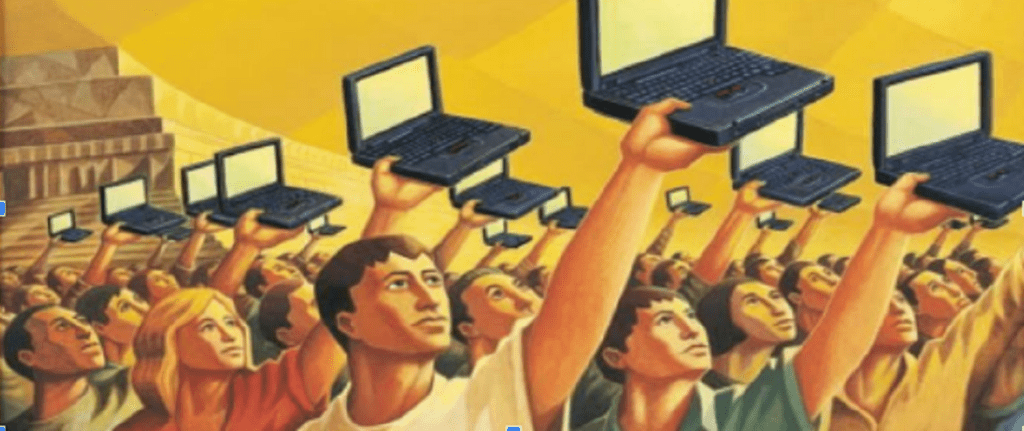By Rana Danish Nisar
“Changing” is the law of nature. Apart from all classical/traditional norms, values and all other notions, things need changes; for harmony or peace.

With the rise of globalization and the wisdom of the global world, the basic previous concepts/wisdoms have taught paradigm shift or transition. The 21st century is the era of transition: from Globalization to Digital-Globalization/E-Globalization and from Democracy to E-democracy. Here, the “E” stands for “Electronic”. “E Democracy” is the mixture of two words “Electronic and Democracy” which is commonly known now as “Digital Democracy” as well as “Internet Democracy”.
Today, in the digital world, the internet has been playing its vivacious role with the aim to reshape the globe. Moreover, states use internet or digital/computerized power for self-interest, security, survival, restoration of regimes or for propaganda. In the tangible modest words, “Digital Democracy” is the use of information and communication advanced technology in political and good governance processes.
Remarkably, the digital democracy is the process where the all citizens, particular adults and specifically all interest users are supposed to be very adequate to do participation correspondingly, correspondingly and harmoniously in the proposals, developments, creations of government, downfall of the governments, selection of leaders, rise the voice of their rights and formations of laws.
The model of “digital democracy” firstly coined by “Steven Clift” in which he comprehends societal, monetary and folk settings that permit the “free and equal practice of
“Political self-autonomy”. According to Steven Clift, E-democracy has multiple goals including expanding democracy, enlightening democracy and democratic values, and disrupting undemocratic terms. He inks that internet tools should be used for participation such as electronic voting with appropriate perseverance and with attaining a shared harmonious legitimate as well as “De-Jure” goals and objectives.
Moreover, Digital democracy would enhance the wisdom and importance of “e-voting” and deny the previous traditional/classical ballots structure. Interestingly, the E-democracy would be helpful to access the contemporary pot of knowledge. Additionally, liberalism/idealism seems clear in this wisdom which means the “free speech, freedom of write, freedom of speech, sharing of thoughts, upgrading the cultural norms, exchange of cultural sentiments, friendly environment, and virtuous behavior among masses or honorable users.
Todays, social media is more and most powerful as past and in this context up-to-the-minute egalitarianisme are largely demonstrative democracies, where all “citizens of Internet” elect their governments to accomplish the construction of new regimes, downfall of previous ones, making and implementations of laws, build-up public opinion and propagate their views and rule over others minds.
In the example of Developed countries such as Europe, particularly the United States of America, politics have become dependent on not only quiet but definitely on the internet because it provides more information and knowledge for most Americans. In fact, internet is the tool of forum which educate people in the context of democracy, helping people to well know about the what happening in the state precisely come to know the up-to-date updates of government policies, opposition criticism, government working quality and quantity and most importantly open free forum to do criticism as you like to do on any issue either it is government policies, their quality of work or any other matters.
The “Online Advertising” is now becoming not only in the USA but worldwide popular for all political candidates, crowd’s opinion, public opinion on propositions. Most people depend on the internet to get information eithers it’s fake or real. The role of search engines i.e. Google, Yahoo along with social apps i.e. Facebook, Twitter, Instagram etc are increasing the adults or people how-know regarding politics or giving a simple and clear knowledge to select their personal beloved political leadership, support political parties or promulgate transmission of false or true news. These social applications most importantly Facebook (2.9 Billion Users), Twitter (330 Million users), Instagram (1 Billion users) allow people or their users to express their opinions openly or secretly and judgment-free as well.
Owing to the hefty size of the internet, any user has the easy potential to go viral and gain more impact over a no doubt a large number of viewers. In the politics context, on the E-democracy platform, the internet enables its users to get and support evidence about Office-bearers and it allows all politicians to catch instructions from the folks. The cooperative supervisory and problem deciphering offers supplementary and more supremacy to the inhabitants and supports statesmen to make verdicts quicker. In a positive perspective, it makes society more harmonious and productive where the problems can be solved easily, productively and efficiently.
With the delicate aptitude to interconnect with the public, the government is capable of doing jobs more proficiently and meritoriously. The 2016’s American elections Trump VS Hillary Clinton, 2020 Elections Trump VS Biden, both candidates use their social accounts and make it possible to make direct connections with their beloved followers. Internet and social applications played a really excellent role during Narendra Modi’s election campaign during 2014 and 2019 general elections. In the perspective of Imran Khan’s 2018 election campaign, Facebook really played well to reshape Pakistan’s public opinion in the favor of PTI’s political party, consequently winning the election game for Imran Khan. On the contrary, e-democracy could be used for defame or illusions or disruptions of real democratic values.
Politicians usually use social applications against their rivals and always try their best to defame them or restrict the thoughts of the masses against their rivals. Apart from the real and tangible truthfulness of news and information, the internet is also a source of fake news. There is no doubt that e-democracy magnifies the opportunity to implement proper voting privileges in political elections but there is always risk of cyber-attacks in the room and according to some political scientists, “Ballots” are still nontoxic methods to tactic an election. In inference, now the E-democracy is the part of power-politics, power-economic dogmas, and all biggest source of building-up public and world opinion in your favor or you’re against and the governments, states and political leadership should be used this “Neo democracy” carefully and sensibly otherwise the consequences could be more hazardous, perilous and treacherous and could rise in-depth chaos and instability within the states or demolish the internal sovereignty and sometimes external sovereignty as well.
Rana Danish Nisar – The author is a PhD (International Relations) Student at the School of Politics and International Studies (SPIS). He holds Mphil in (International Relations), Masters in (Pakistan Studies), and Masters in (International Relations) degrees. He won acceptance Harvard Project for Asian and International Relations HPAIR (USA), 2017. His research interests are broadly in South Asian Affairs, South Asia Geo-Politics, India-Pakistan Relations, South Asian Nuclear Politics, US and South Asia, Indian Ocean, Security studies, South Asian developments studies.
(The views expressed in this article belong only to the author and do not necessarily reflect the views of World Geostrategic Insights).







